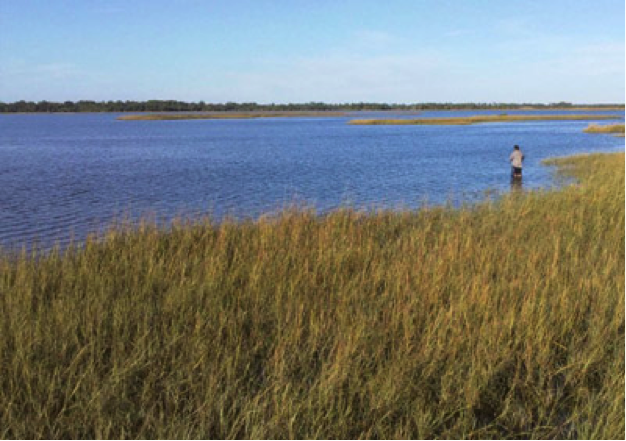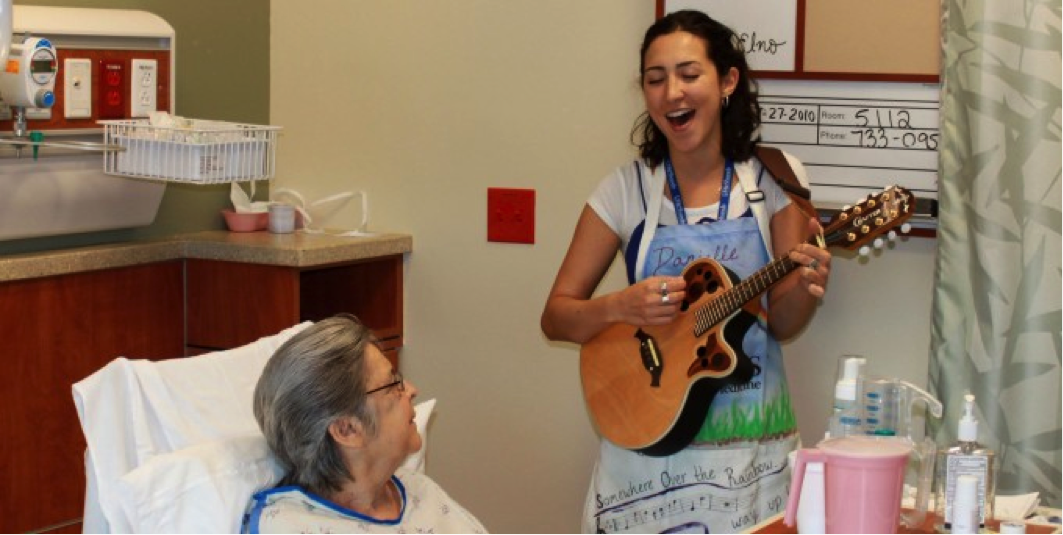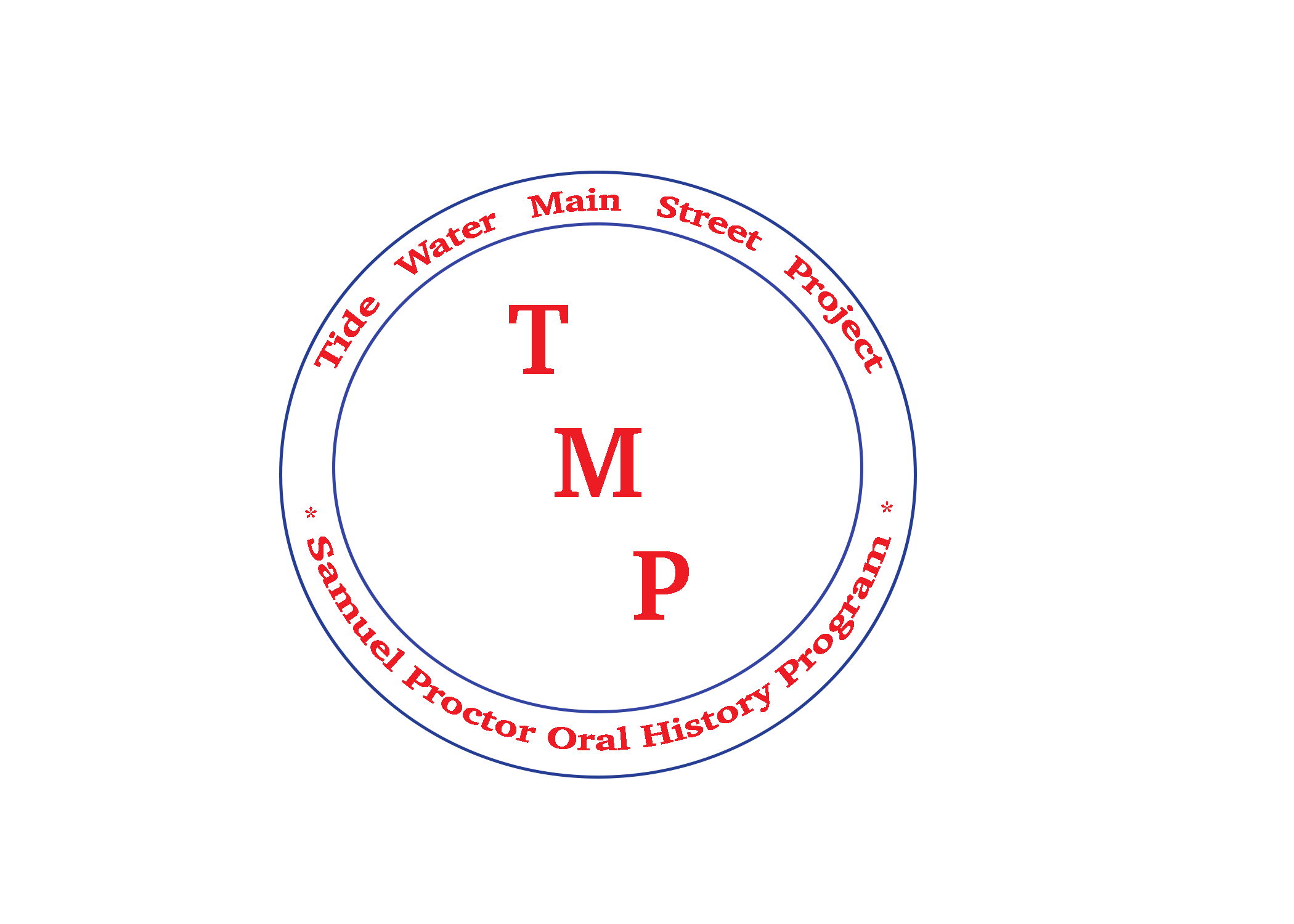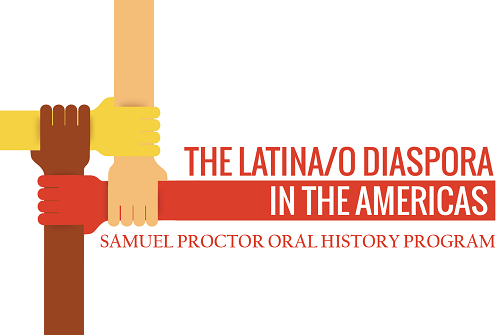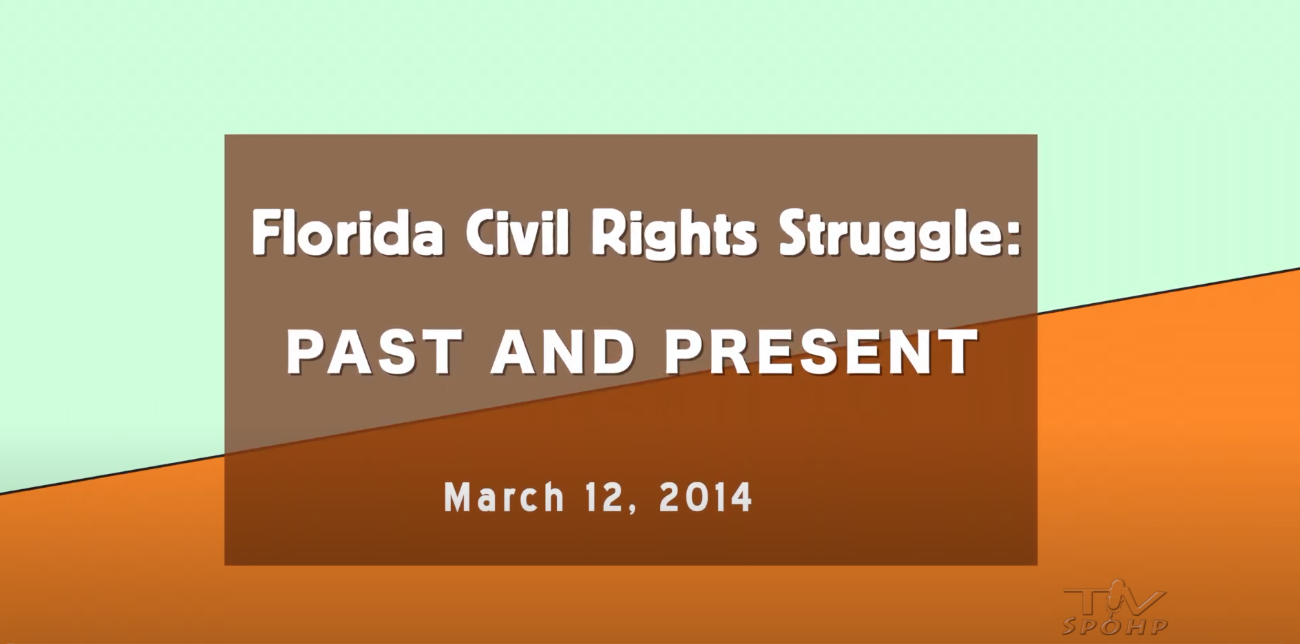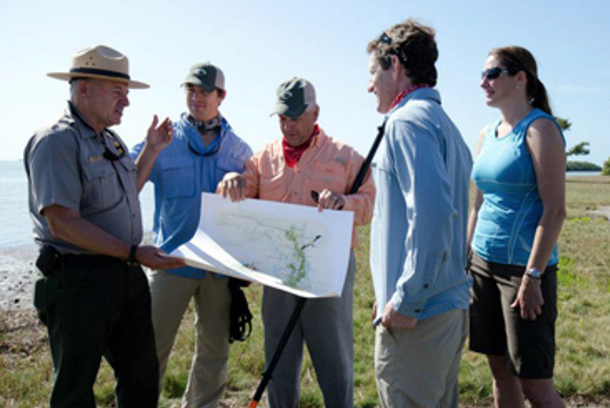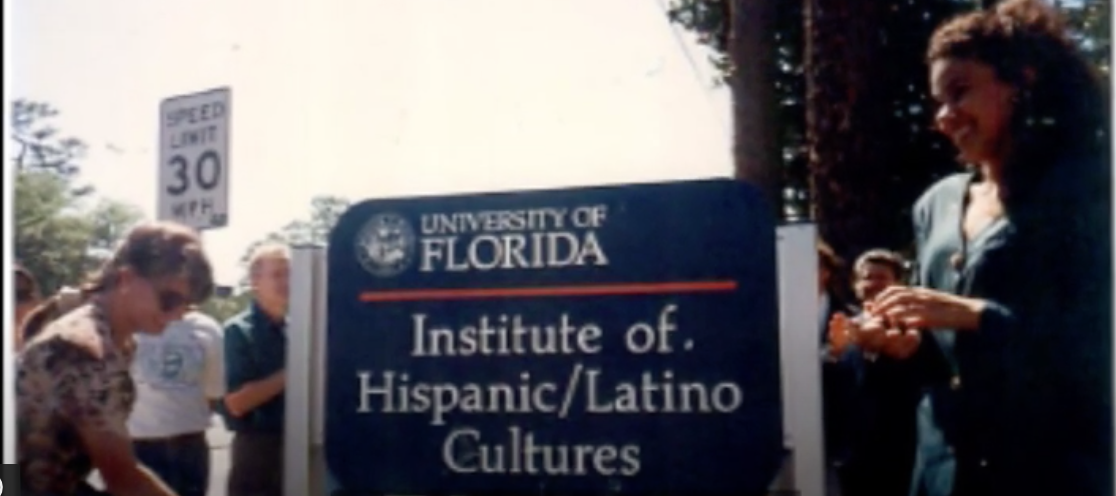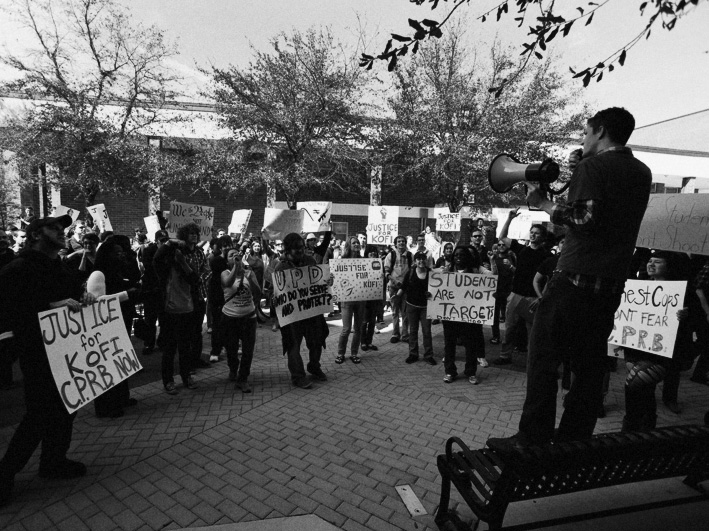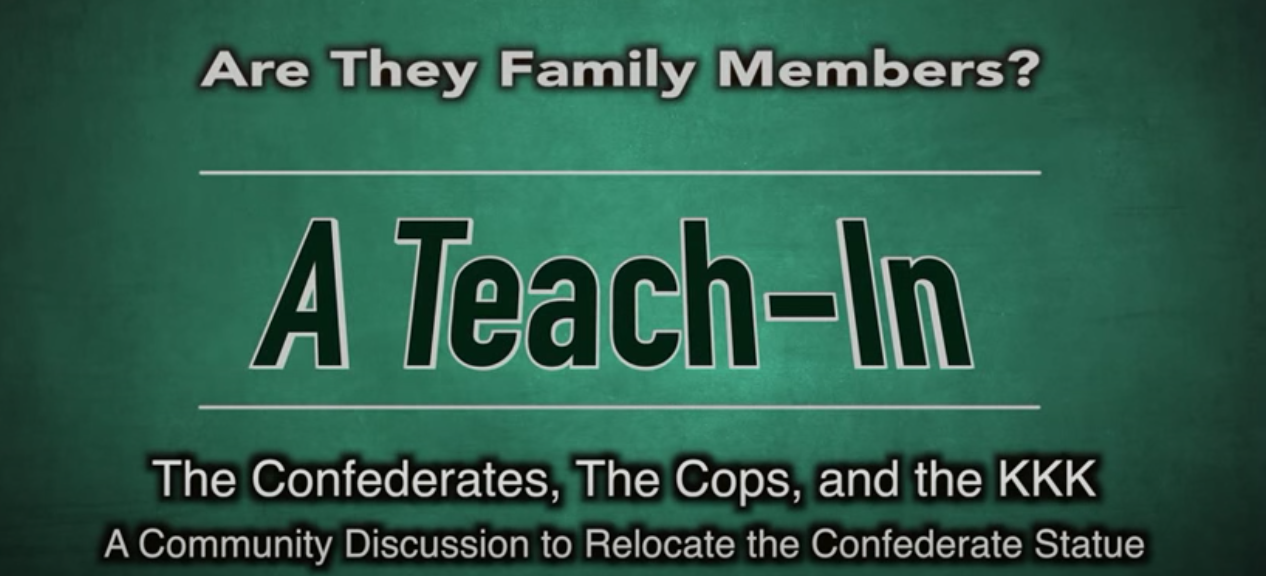Enjoy this gallery of civically-engaged arts, humanities, and design projects. Add your project here
2014
The College of Design, Construction and Planning is rapidly becoming a leader in the area of sea level rise and climate change adaptation planning.
Building on existing and previous UF research, three sea level rise adaptation planning projects led by DCP faculty recently received funding from the National Oceanic and Atmospheric Administration (NOAA) through the Florida and Mississippi-Alabama Sea Grant programs.
Research on global systems suggests that coastal communities and regions are becoming increasingly vulnerable to sea level rise and climate change. As a result, researchers and practitioners are developing processes, tools and strategies for adapting to future impacts.
Zhong-Ren Peng, professor of urban and regional planning is directing the first project, titled “Development of Sea Level Rise Adaptation Planning Procedures and Tools Using NOAA Sea Level Rise Impacts Viewer.” The project will improve the “Viewer” by incorporating more data and functions as a decision support tool to help local planners better understand regional vulnerability and prioritize adaptation options. The project team will partner with the Tampa Bay Regional Planning Council in Florida.
2014
The College of Design, Construction and Planning is rapidly becoming a leader in the area of sea level rise and climate change adaptation planning.
Building on existing and previous UF research, three sea level rise adaptation planning projects led by DCP faculty recently received funding from the National Oceanic and Atmospheric Administration (NOAA) through the Florida and Mississippi-Alabama Sea Grant programs.
Research on global systems suggests that coastal communities and regions are becoming increasingly vulnerable to sea level rise and climate change. As a result, researchers and practitioners are developing processes, tools and strategies for adapting to future impacts.
Zhong-Ren Peng, professor of urban and regional planning is directing the first project, titled “Development of Sea Level Rise Adaptation Planning Procedures and Tools Using NOAA Sea Level Rise Impacts Viewer.” The project will improve the “Viewer” by incorporating more data and functions as a decision support tool to help local planners better understand regional vulnerability and prioritize adaptation options. The project team will partner with the Tampa Bay Regional Planning Council in Florida.
2014
Artists in Residence work annually with over 100 volunteers from the Gainesville community and the University of Florida to engage patients, families and staff in creative disciplines of dance, writing, music, visual and contemplative arts.
The dynamic of patient and artist working together fosters open communication, avenues for expression, opportunities to deal with fear, and strengthens the patient’s sense of control during times of crisis. This collaboration serves two purposes: allows patients and families to participate in activities that enhance the hospital experience and to display their work in order to personalize the physical setting and make it more inspiring.
2014
Artists in Residence work annually with over 100 volunteers from the Gainesville community and the University of Florida to engage patients, families and staff in creative disciplines of dance, writing, music, visual and contemplative arts.
The dynamic of patient and artist working together fosters open communication, avenues for expression, opportunities to deal with fear, and strengthens the patient’s sense of control during times of crisis. This collaboration serves two purposes: allows patients and families to participate in activities that enhance the hospital experience and to display their work in order to personalize the physical setting and make it more inspiring.
2014
The Tidewater Main Street Project (TMP) is dedicated to documenting the traditions, folklore, and history of the rural communities in the tidewater region of Virginia through student fieldwork and community engagement. Since 2014, SPOHP has been leading student fieldwork trips to Virginia to build upon its 200+ oral history collection.
2014
The Tidewater Main Street Project (TMP) is dedicated to documenting the traditions, folklore, and history of the rural communities in the tidewater region of Virginia through student fieldwork and community engagement. Since 2014, SPOHP has been leading student fieldwork trips to Virginia to build upon its 200+ oral history collection.
2014
Extension Reconsidered is a national Imagining America initiative that invites citizens to imagine alternative futures for extension and outreach work across American higher education. Key to this initiative is considering how practices in arts, humanities, and design fields can inform new visions of what Cooperative Extension can. These fields share many things alike, including increasing exigencies to generate revenue, reach new audiences, and communicate ideas in new ways. These fields are all centered on our university’s civic mission by fostering attitudes of mind and capacities that will enable citizens to meet individual and civic problems with which they are confronted.
2014
Extension Reconsidered is a national Imagining America initiative that invites citizens to imagine alternative futures for extension and outreach work across American higher education. Key to this initiative is considering how practices in arts, humanities, and design fields can inform new visions of what Cooperative Extension can. These fields share many things alike, including increasing exigencies to generate revenue, reach new audiences, and communicate ideas in new ways. These fields are all centered on our university’s civic mission by fostering attitudes of mind and capacities that will enable citizens to meet individual and civic problems with which they are confronted.
2014
The Latinx Diaspora in the Americas Project, founded in 2014, is a growing, award-winning archive of 100+ oral histories dedicated to creating space for Latina/os to share their historical experiences related to identity, immigration reform, labor conditions, education, and civil rights.
2014
The Latinx Diaspora in the Americas Project, founded in 2014, is a growing, award-winning archive of 100+ oral histories dedicated to creating space for Latina/os to share their historical experiences related to identity, immigration reform, labor conditions, education, and civil rights.
2014
This SPOHP 2014 program celebrates those who fought for equality with a panel of Civil Rights Veterans and a showcase of stories from the Movement. Panelists include Dan Harmeling, John Due, Vivian Filer, and Rosemary Florence. Moderated by Dr. Paul Ortiz.
Celebrate those who fought for equality with a panel of Civil Rights Veterans and a showcase of stories from the Movement.
With Panelists
Dan Harmeling
Vivian Filer
John Due
Rosemary Florence
Moderated by Paul Ortiz, University of Florida, Rev. Milford Griner, Invocation
Oral History Readings by
Samantha Turner [AAHP 248B Mary Hall Daniels]
Toni-Lee Maitland [MFP 006B Margaret Block]
Nadine Lewis [BTV 052 Mary Ola Gaines]
Sebastian Wright [AAHP 040 Reuben Brigety]
Co-Sponsors: UF Center for the Humanities and the Public Sphere, Rothman Endowment, UF Center for Women's Studies and Gender Research, UF African American Studies Program, UF Office of Lesbian, Gay, Bisexual, and Transgender Affairs
2014
This SPOHP 2014 program celebrates those who fought for equality with a panel of Civil Rights Veterans and a showcase of stories from the Movement. Panelists include Dan Harmeling, John Due, Vivian Filer, and Rosemary Florence. Moderated by Dr. Paul Ortiz.
Celebrate those who fought for equality with a panel of Civil Rights Veterans and a showcase of stories from the Movement.
With Panelists
Dan Harmeling
Vivian Filer
John Due
Rosemary Florence
Moderated by Paul Ortiz, University of Florida, Rev. Milford Griner, Invocation
Oral History Readings by
Samantha Turner [AAHP 248B Mary Hall Daniels]
Toni-Lee Maitland [MFP 006B Margaret Block]
Nadine Lewis [BTV 052 Mary Ola Gaines]
Sebastian Wright [AAHP 040 Reuben Brigety]
Co-Sponsors: UF Center for the Humanities and the Public Sphere, Rothman Endowment, UF Center for Women's Studies and Gender Research, UF African American Studies Program, UF Office of Lesbian, Gay, Bisexual, and Transgender Affairs
2014
The Florida Wildlife Corridor promotes the vision of an ecologically-connected network of public and private conservation lands eventually created throughout Florida, which was conceived of by Carlton Ward from LINC and developed in collaboration with Tom Hoctor. The Florida Wildlife Corridor project was developed to educate and advocate for the protection of the Florida Ecological Greenways Network, and specifically the Critical Linkages from south Florida to Georgia, though the other Critical Linkages from west-central Florida through the Florida panhandle might be added to these efforts in the future.
2014
The Florida Wildlife Corridor promotes the vision of an ecologically-connected network of public and private conservation lands eventually created throughout Florida, which was conceived of by Carlton Ward from LINC and developed in collaboration with Tom Hoctor. The Florida Wildlife Corridor project was developed to educate and advocate for the protection of the Florida Ecological Greenways Network, and specifically the Critical Linkages from south Florida to Georgia, though the other Critical Linkages from west-central Florida through the Florida panhandle might be added to these efforts in the future.
2014
The Center is working with the Conservation Trust for Florida (CTF) and the Legacy Institute for Nature and Culture (LINC) on an education and outreach campaign highlighting the significant and pressing opportunity to protect wildlife corridors across the state of Florida. The Florida Wildlife Corridor promotes the vision of an ecologically-connected network of public and private conservation lands eventually created throughout Florida, which was conceived of by Carlton Ward from LINC and developed in collaboration with Tom Hoctor. The Florida Wildlife Corridor project was developed to educate and advocate for the protection of the Florida Ecological Greenways Network, and specifically the Critical Linkages from south Florida to Georgia, though the other Critical Linkages from west-central Florida through the Florida panhandle might be added to these efforts in the future.
In 2012, a four-person Expedition team completed a 100-day, 1000-mile journey to raise awareness for the Florida Wildlife Corridor opportunity. October 11, 2014 marks the kick off for the second expedition to expand public awareness and generate support for a connected Florida Wildlife Corridor.
2014
The Center is working with the Conservation Trust for Florida (CTF) and the Legacy Institute for Nature and Culture (LINC) on an education and outreach campaign highlighting the significant and pressing opportunity to protect wildlife corridors across the state of Florida. The Florida Wildlife Corridor promotes the vision of an ecologically-connected network of public and private conservation lands eventually created throughout Florida, which was conceived of by Carlton Ward from LINC and developed in collaboration with Tom Hoctor. The Florida Wildlife Corridor project was developed to educate and advocate for the protection of the Florida Ecological Greenways Network, and specifically the Critical Linkages from south Florida to Georgia, though the other Critical Linkages from west-central Florida through the Florida panhandle might be added to these efforts in the future.
In 2012, a four-person Expedition team completed a 100-day, 1000-mile journey to raise awareness for the Florida Wildlife Corridor opportunity. October 11, 2014 marks the kick off for the second expedition to expand public awareness and generate support for a connected Florida Wildlife Corridor.
2015
The Making of La Casita is a documentary film produced by the Samuel Proctor Oral History Program and funded by the UF Office of the Provost. Discussing the origins of the Institute of Hispanic-Latino Cultures at UF (known as “La Casita”) the film chronicles the history of Latinx students and faculty at the University of Florida.
This film draws on oral history interviews conducted by students, staff and volunteers at the Proctor Program to explore the historical and political complexity of identifying as Latina/o as well as the diversity within the Latinx population. The film’s narrators discuss the need to cultivate one’s own Latinx identity in higher education through exposure to a rigorous academic program of ethnic studies.
The Making of La Casita recounts the many ways students, faculty and past directors have worked to make La Casita an enduring space for education, advocacy, community, and academic excellence.
The Samuel Proctor Oral History Program is thrilled to present The Making of the Institute of Black Culture (IBC) and The Making of La Casita. These documentaries were produced with generous funding by the UF Office of the Provost.
Provost funds also made possible a university seminar titled “A Black and Latinx History of the Gator Nation,” taught by Dr. Ryan Morini, Juliette Barbera, and Juanita Duque and sponsored by the African American Studies Program.
This film draws on oral history interviews conducted by students, staff and volunteers at the Proctor Program to explore the historical and political complexity of identifying as Latina/o as well as the diversity within the Latinx population. The film’s narrators discuss the need to cultivate one’s own Latinx identity in higher education through exposure to a rigorous academic program of ethnic studies.
These interviews began with a collaboration between Dr. Paul Ortiz, Dr. Eric Castillo, and Nathalia Hernandez Ochoa, and continued through the efforts of Génesis Lara and the 2014-2015 LDAP class. The current film builds on these prior efforts through the work of Juliette Barbera, Juanita Duque, Aliya Miranda, and many other students and recent graduates.
2015
The Making of La Casita is a documentary film produced by the Samuel Proctor Oral History Program and funded by the UF Office of the Provost. Discussing the origins of the Institute of Hispanic-Latino Cultures at UF (known as “La Casita”) the film chronicles the history of Latinx students and faculty at the University of Florida.
This film draws on oral history interviews conducted by students, staff and volunteers at the Proctor Program to explore the historical and political complexity of identifying as Latina/o as well as the diversity within the Latinx population. The film’s narrators discuss the need to cultivate one’s own Latinx identity in higher education through exposure to a rigorous academic program of ethnic studies.
The Making of La Casita recounts the many ways students, faculty and past directors have worked to make La Casita an enduring space for education, advocacy, community, and academic excellence.
The Samuel Proctor Oral History Program is thrilled to present The Making of the Institute of Black Culture (IBC) and The Making of La Casita. These documentaries were produced with generous funding by the UF Office of the Provost.
Provost funds also made possible a university seminar titled “A Black and Latinx History of the Gator Nation,” taught by Dr. Ryan Morini, Juliette Barbera, and Juanita Duque and sponsored by the African American Studies Program.
This film draws on oral history interviews conducted by students, staff and volunteers at the Proctor Program to explore the historical and political complexity of identifying as Latina/o as well as the diversity within the Latinx population. The film’s narrators discuss the need to cultivate one’s own Latinx identity in higher education through exposure to a rigorous academic program of ethnic studies.
These interviews began with a collaboration between Dr. Paul Ortiz, Dr. Eric Castillo, and Nathalia Hernandez Ochoa, and continued through the efforts of Génesis Lara and the 2014-2015 LDAP class. The current film builds on these prior efforts through the work of Juliette Barbera, Juanita Duque, Aliya Miranda, and many other students and recent graduates.
2015
When heavily armed campus police broke into the University of Florida
campus apartment of disabled and unarmed Ghanaian doctoral student
Kofi Adu-Brempong, and within a minute of entry shot him in the face,
his life was forever changed. Yet the officer who shot him, who had
previously been caught cruising through town throwing eggs at
residents of a Black neighborhood, was neither suspended nor fired.
This documentary is about the ongoing pattern of police brutality
against Blacks and the dangers of over militarized campuses. It is
about student protests that led to the administration dropping charges
against Kofi and about continuing student efforts to revoke SWAT-like
teams on campus and to establish police review boards.
2015
When heavily armed campus police broke into the University of Florida
campus apartment of disabled and unarmed Ghanaian doctoral student
Kofi Adu-Brempong, and within a minute of entry shot him in the face,
his life was forever changed. Yet the officer who shot him, who had
previously been caught cruising through town throwing eggs at
residents of a Black neighborhood, was neither suspended nor fired.
This documentary is about the ongoing pattern of police brutality
against Blacks and the dangers of over militarized campuses. It is
about student protests that led to the administration dropping charges
against Kofi and about continuing student efforts to revoke SWAT-like
teams on campus and to establish police review boards.
2015
A Student Documentary produced Spring Semester of 2015 for the Latina/o Diaspora in the Americas seminar of the Samuel Proctor Oral History Program.
The students conducted 18 interviews of faculty and students to produce this documentary using oral histories.
2015
A Student Documentary produced Spring Semester of 2015 for the Latina/o Diaspora in the Americas seminar of the Samuel Proctor Oral History Program.
The students conducted 18 interviews of faculty and students to produce this documentary using oral histories.
2015
Dr. Paul Ortiz talks about Stetson Kennedy’s life and legacy in a presentation at the Civic Media Center on October 18, 2011. The Civic Media Center in Gainesville, Florida, is the repository for many of the late Stetson Kennedy’s books.
Dr. Ortiz is joined by Sandra Parks Kennedy, wife of Stetson Kennedy, as she remembers her husband’s life.
2015
Dr. Paul Ortiz talks about Stetson Kennedy’s life and legacy in a presentation at the Civic Media Center on October 18, 2011. The Civic Media Center in Gainesville, Florida, is the repository for many of the late Stetson Kennedy’s books.
Dr. Ortiz is joined by Sandra Parks Kennedy, wife of Stetson Kennedy, as she remembers her husband’s life.
2015
This year, [2015] the nation has witnessed and commemorated a series of Civil Rights Anniversaries. The fiftieth anniversaries of “Bloody Sunday” and the passage of the Voting Rights Act of 1965 have encouraged the public to celebrate the courage and resolve of both the sung and unsung figures of the Civil Rights Movement. However, the upcoming fiftieth anniversary of the Watts Uprising in Los Angeles, in the context of the recent uprisings in Ferguson, Baltimore and New York, is a sobering reminder that the resolve and courage of the Civil Rights figures is desperately and urgently necessary today. For as Martha Ragland, former president of the Tennessee Council of Human Relations, declared, “We need quickly and massively to attend to the unfinished business of democracy.”
Recognizing the “unfinished” project of democracy, the members of this panel will address race, democracy and ongoing struggles for civil rights in academia, communities and the nation at large. The presentations range from meditations on the emotional and psychological effects of freedom fighting on Civil Rights figures to discussions of the continuous neglect of Black, female activists in the historical accounts of the Civil Rights to inquiries into the present status of democracy in a society riddled with police brutality and state violence. The “Unfinished Business: Race, Democracy and the Ongoing Struggle for Civil Rights” panel seeks to bring all of these issues to the forefront to highlight the vital need for nuanced, collaborative and interdisciplinary approaches to both the past and present racial struggles.
Justin Dunnavant is a doctoral student studying archaeology in the Department of Anthropology at the University of Florida.
Randi Gill-Sadler is a doctoral candidate in the English Department and joined SPOHP in Fall 2014 as a graduate coordinator.
Justin Hosbey is a doctoral student in the Department of Anthropology at the University of Florida.
Darrell White is the Director of the Natchez African American History and Culture
Dr. Paul Ortiz is a history professor at the University of Florida
2015
This year, [2015] the nation has witnessed and commemorated a series of Civil Rights Anniversaries. The fiftieth anniversaries of “Bloody Sunday” and the passage of the Voting Rights Act of 1965 have encouraged the public to celebrate the courage and resolve of both the sung and unsung figures of the Civil Rights Movement. However, the upcoming fiftieth anniversary of the Watts Uprising in Los Angeles, in the context of the recent uprisings in Ferguson, Baltimore and New York, is a sobering reminder that the resolve and courage of the Civil Rights figures is desperately and urgently necessary today. For as Martha Ragland, former president of the Tennessee Council of Human Relations, declared, “We need quickly and massively to attend to the unfinished business of democracy.”
Recognizing the “unfinished” project of democracy, the members of this panel will address race, democracy and ongoing struggles for civil rights in academia, communities and the nation at large. The presentations range from meditations on the emotional and psychological effects of freedom fighting on Civil Rights figures to discussions of the continuous neglect of Black, female activists in the historical accounts of the Civil Rights to inquiries into the present status of democracy in a society riddled with police brutality and state violence. The “Unfinished Business: Race, Democracy and the Ongoing Struggle for Civil Rights” panel seeks to bring all of these issues to the forefront to highlight the vital need for nuanced, collaborative and interdisciplinary approaches to both the past and present racial struggles.
Justin Dunnavant is a doctoral student studying archaeology in the Department of Anthropology at the University of Florida.
Randi Gill-Sadler is a doctoral candidate in the English Department and joined SPOHP in Fall 2014 as a graduate coordinator.
Justin Hosbey is a doctoral student in the Department of Anthropology at the University of Florida.
Darrell White is the Director of the Natchez African American History and Culture
Dr. Paul Ortiz is a history professor at the University of Florida
2015
In 1904 amid speeches, barbeques and fanfare, the United Daughters of the Confederacy Kirby Smith Chapter No. 202 placed a statue, “ In Memory of the Confederate Dead 1861 – 1865,” in front of what was then the county courthouse. The 18-foot statue is supported on a pedestal made of Georgia granite. The monument was funded through private contributions and that final list of donors is purportedly sealed within. The courthouse has long been replaced by newer buildings, over time trees and roads have grown up around the statue. On August 22, 2015, one hundred and eleven years later the Confederate Statue’s symbolism is revisited through lectures and public discussion asking these questions: Should it be removed from its present public space? Could it fit into a modern public sphere?
Speakers Paul Ortiz, Zoharah Simmons, Malini Schueller, Nailah Summers, Jack Price, Carol Thomas, and attending members of the community provide valuable insight for those interested in probing this discussion.
2015
In 1904 amid speeches, barbeques and fanfare, the United Daughters of the Confederacy Kirby Smith Chapter No. 202 placed a statue, “ In Memory of the Confederate Dead 1861 – 1865,” in front of what was then the county courthouse. The 18-foot statue is supported on a pedestal made of Georgia granite. The monument was funded through private contributions and that final list of donors is purportedly sealed within. The courthouse has long been replaced by newer buildings, over time trees and roads have grown up around the statue. On August 22, 2015, one hundred and eleven years later the Confederate Statue’s symbolism is revisited through lectures and public discussion asking these questions: Should it be removed from its present public space? Could it fit into a modern public sphere?
Speakers Paul Ortiz, Zoharah Simmons, Malini Schueller, Nailah Summers, Jack Price, Carol Thomas, and attending members of the community provide valuable insight for those interested in probing this discussion.
2015
Writing for the Public is a professional development seminar sponsored by the Center for the Humanities and the Public Sphere at the University of Florida. The event, organized by Dr. Sean Trainor, was held on 12/11/2015. The seminar is designed to teach participants how to effectively engage the public through their writing.
Public engagement is no longer optional for scholars and educators in humanities. It is now a basic professional requirement: a way in which we claim our scholarly territory, justify humanistic enterprise before skeptical publics, demonstrate public impacts of work for funding bodies, and prepare for uncertain job markets.
2015
Writing for the Public is a professional development seminar sponsored by the Center for the Humanities and the Public Sphere at the University of Florida. The event, organized by Dr. Sean Trainor, was held on 12/11/2015. The seminar is designed to teach participants how to effectively engage the public through their writing.
Public engagement is no longer optional for scholars and educators in humanities. It is now a basic professional requirement: a way in which we claim our scholarly territory, justify humanistic enterprise before skeptical publics, demonstrate public impacts of work for funding bodies, and prepare for uncertain job markets.
